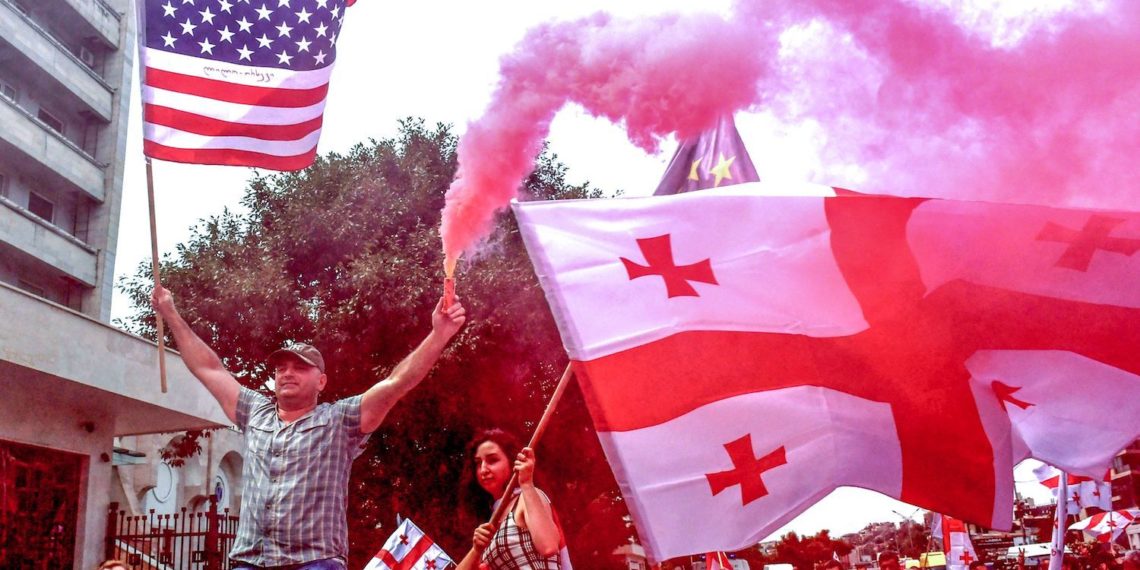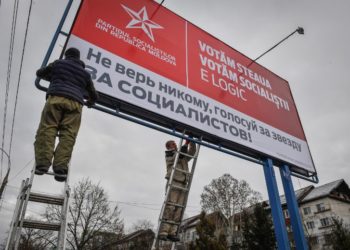In the field of global affairs, you’re either an ally or in need of one.
And if you are a freshly transitioned democracy with a Soviet legacy, unstable economy, and a raging pandemic you are – most likely – in need of many.
Since the fall of the Soviet Union, regional experts have debated the foreign policy agendas of post-Soviet countries, at times referred to as “in-between states.” The name references a balance each country needs to strike while working with Russian and Western partners. But how does balance translate into assistance in times of crisis?
Georgia’s Western Trajectory
Georgia has been aggressive in its foreign policy. It seeks no equilibrium, but rather a strict Western trajectory. For the last 20 years, the country has strived for both NATO and EU membership.
The latter culminated in Georgia signing the EU Association Agreement in 2014 (with the agreement coming into force in 2016), which has since granted Georgian citizens a visa-free regime across the Schengen zone.
The Georgian Parliament further defines the United States as a “major strategic partner and ally,” backed by the US-Georgia Charter on Strategic Partnership, signed in 2009 in response to the 2008 Russia-Georgia war.

Yet, over the past few years, academics, professors, and think-tank and NGO professionals have continuously tried to draft a “third-way” plan – an alternative to a strictly pro-Russian or pro-Western agenda. Some have even gone so far as to state that countries like Georgia will never have national sovereignty, and hence, decisions should be made externally, on their behalf.
What these professionals do not realize, however, is that this alternative will never go past their academic articles or organizational reports. The small Caucasian country has no interest in alternatives. Georgia makes its own decisions, and the COVID-19 crisis has proved the country’s judgment right.
US and EU Support
On May 8, the United States pledged $3 million to support Georgia’s fight against the pandemic. This assistance came as an add-on to $1.1 million that Georgia received in health funding in late March, together with 2,000 test kits and $800,000 worth of equipment to help farmers overcome pandemic-related economic hurdles.
Though $1.1 million for health funding looks like a standard USAID package allocated to countries in the region, Georgia’s robust partnership with the United States is reflected in the overall amount of aid each country has received over the years.
A US government report claims that Georgia has received over $3.6 billion in total US assistance over 20 years, as opposed to $1.57 billion for Armenia, $890 million for Azerbaijan, and $1 billion for Moldova.
🇬🇪🇺🇸 U.S. Government commits $1 million in new USAID funding for #COVID19 response in #Georgia. New assistance to be delivered in partnership with UNICEF – hygiene and medical supplies, support for rapid response teams, case management, infection control, and communications. pic.twitter.com/bbx9wO3CPX
— USAID Georgia (@USAIDGeorgia) June 4, 2020
The EU has also shown strong support for Georgia and the rest of its Eastern Partnership countries. Georgia was allocated 183 million euros ($206.8 million) to support immediate and short-term needs, only 7 million euros ($6 million) less than Ukraine, the program’s largest aid recipient.
Ukraine’s leadership in aid comes as no surprise, considering that the country could fit eight Georgias inside its borders, while also housing 40 million more citizens. On the other hand, Armenia, the third-largest aid recipient, was allocated nearly 100 million euros ($113 million) less through the program, with Azerbaijan getting merely 14 million euros ($15.8 million).
Georgia’s generous aid package is not a result of its population size or magnitude – it’s the country’s foreign policy that is reaping results.
In the meantime, what has Russia done for its allies?
Lacking Russian Support
In March, Russia ceremonially sent an assistance package to Italy, comprising medical supplies and over 100 epidemiological and virus experts. Shortly after, the Italian newspaper La Stampa reported that 80 percent of Russia’s aid package proved to be “totally useless.”
The dispatched experts also raised questions, as they were sent from the Russian defense ministry as opposed to its health ministry. Sending military officers has since been regarded as a geopolitical scheme rather than emergency assistance. Russian presence in a key NATO state has also raised fears that Moscow is using the current critical situation for intelligence-gathering purposes.
Italy’s example supports Georgia’s choice to side with the West. Not only has Russia failed to be of useful assistance as confirmed by its impractical supplies, but it has also been accused of performative allyship driven by self-serving reasons.
Russia’s shortcomings were confirmed with the country’s unwillingness to aid the de facto governments of conflict regions.
On May 6, the International Crisis Group released a report on the counter-pandemic actions undertaken by the breakaway regions of post-Soviet states. According to the report, Russia has made little or no contribution to the de facto governments. This has caused outrage in Luhansk (Ukraine), stating that their commitment to Russia has not even resulted in the country delivering masks to the region.
The Russia-backed Georgian breakaway region of Tskhinvali is also at great risk, due to a significant elder population, severely underequipped hospitals, undertrained medical professionals, and the absence of basic protective gear. Russia, the region’s only ally, has been reluctant to address the challenges and even stopped exporting medical supplies in March.
Progress
So, has Georgia been successful in its fight against the corona crisis purely because of foreign assistance? Of course not. But Georgia’s centuries-old resilient nature would not have been enough either. The will of Georgian people has won many historic battles, but even the Caucasian spirit cannot overcome a deadly virus on its own.
To the academics out there advising Georgia to give up on its EU and NATO dreams and be more “neutral” or more “balanced” for the sake of staying alive, Georgia has a message for you: we are not interested in survival. We left survival in the 1990s. In 2020, we are interested in progress. And progress can be achieved only with one side out of the two.
Disclaimer: The views and opinions expressed here are those of the author and do not necessarily reflect the editorial position of The Globe Post.






















